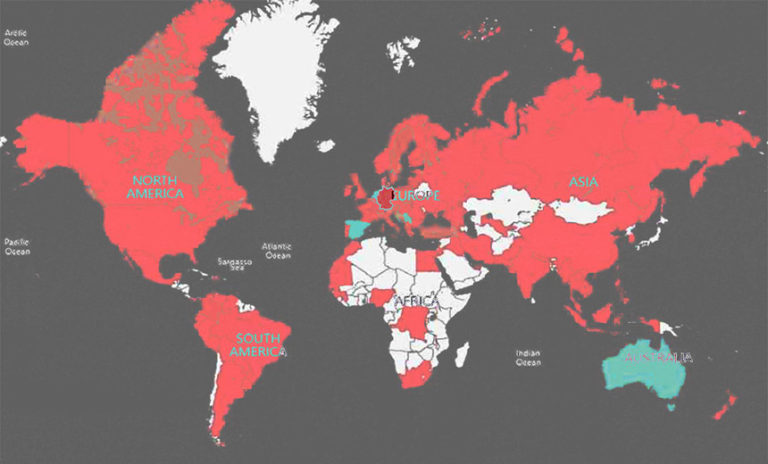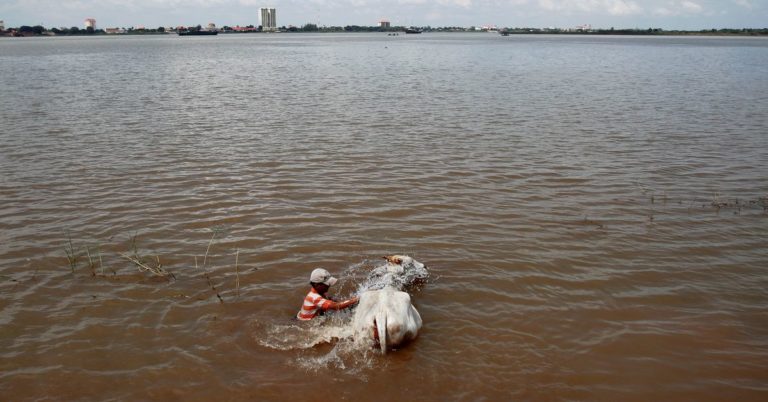Beijing accuses NATO of ‘exaggerating “China threat theory” and creating confrontations’
Beijing has furiously accused NATO of ‘exaggerating “China threat theory” and artificially creating confrontations’ after the Western alliance vowed to take on the country for the first time on Monday.
NATO leaders said they would work together to counter the ‘systemic challenges’ posed by Beijing’s policies, as US President Joe Biden renewed Washington’s transatlantic ties at his first summit with the allies.
In a broad statement of intent, the leaders said China’s increasingly assertive actions in building a nuclear arsenal and space and cyber warfare capabilities threatened the international order.
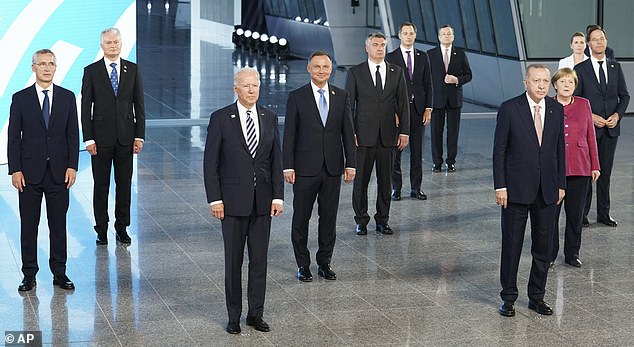
NATO leaders said they would work together to counter the ‘systemic challenges’ posed by Beijing’s policies, as US President Joe Biden (pictured third from left) renewed Washington’s transatlantic ties at his first summit with the allies.
But in an angry response, a statement from the Chinese mission to the European Union called for NATO to ‘view China’s development rationally, stop exaggerating various forms of “China threat theory” and not to use China’s legitimate interests and legal rights as excuses for manipulating group politics (while) artificially creating confrontations’.
It added that NATO’s accusations were a ‘slander of China’s peaceful development, a misjudgement of the international situation and its own role, and it is the continuation of a Cold War mentality and the group’s political psychology at work’.
China’s rebuke of the statement came as a U.S. aircraft carrier group led by the USS Ronald Reagan has entered the South China Sea as part of a routine mission, the U.S. Navy said
Military tensions have increased over the past year between China and rival powers including the United States and India, with flashpoints like the Himalayan border, Taiwan and the South China Sea.
China’s military budget – the second largest in the world after the US, though still less than a third of Washington’s – is set to increase by 6.8 percent in 2021, the finance ministry announced in March.
Beijing has also poured billions into its space programme in a bid to make up ground on pioneers Russia and the United States.
NATO Secretary General Jens Stoltenberg said the allies would seek to cooperate with China on global issues like climate change – but decried Beijing’s increasingly assertive stance on other issues.
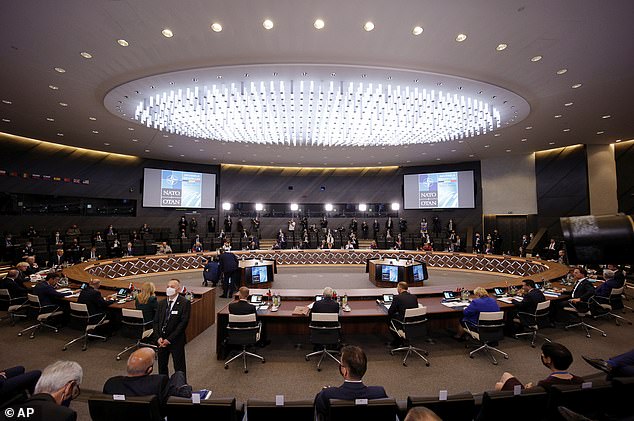
In a broad statement of intent, the NATO leaders said China’s increasingly assertive actions in building a nuclear arsenal and space and cyber warfare capabilities threatened the international order. Pictured: NATO heads of state gather for a plenary session at a NATO summit in Brussels, Monday, June 14, 2021
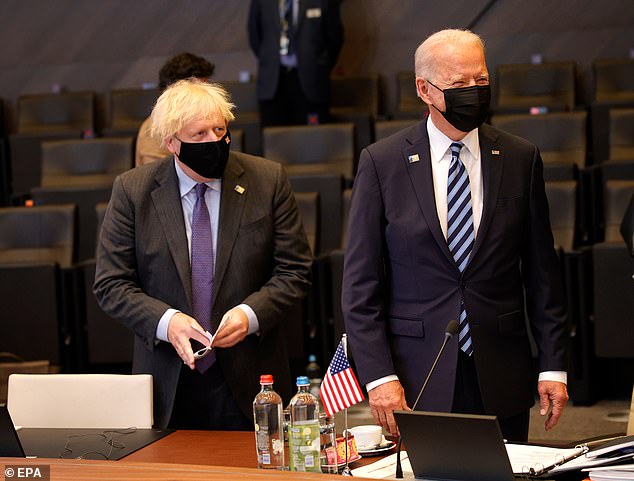
In an angry response to the NATO statement, the Chinese mission to the European Union called for NATO to ‘view China’s development rationally, stop exaggerating various forms of “China threat theory” and not to use China’s legitimate interests and legal rights as excuses for manipulating group politics (while) artificially creating confrontations’. Pictured: US President Joe Biden (R) and British Prime Minister Boris Johnson together, June 14 2021
In the summit statement, the leaders said that China’s goals and ‘assertive behaviour present systemic challenges to the rules-based international order and to areas relevant to alliance security’.
The warning to China comes as President Joe Biden has stepped up his effort to rally allies to speak in a more unified voice about China’s human rights record, its trade practices and its military’s increasingly assertive behaviour that has unnerved US allies in the Pacific.
While the 30 heads of state and government avoided calling China a rival, they expressed concern about what they said were its ‘coercive policies’, the opaque ways it is modernising its armed forces and its use of disinformation.
They called on Beijing to uphold its international commitments and to act responsibly in the international system.
Mr Biden, who arrived at the summit after three days of consulting with G7 allies in England, pushed for the G7 communique there that called out what it said were forced labour practices and other human rights violations affecting Uighur Muslims and other ethnic minorities in the western Xinjiang province.
The president said he was satisfied with the communique, although differences remain among the allies about how forcefully to criticise Beijing.
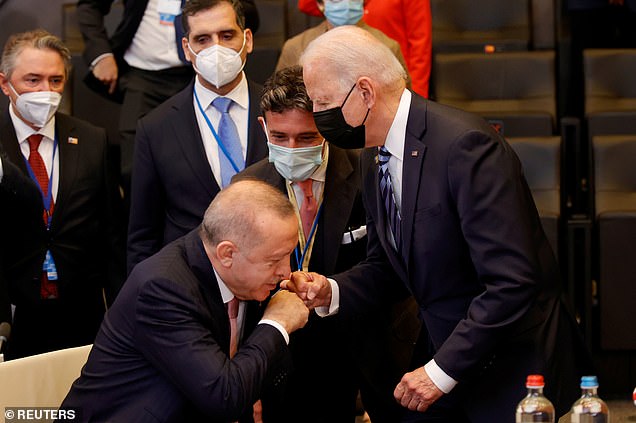
China added that NATO’s accusations were a ‘slander of China’s peaceful development, a misjudgement of the international situation and its own role, and it is the continuation of a Cold War mentality and the group’s political psychology at work’. Pictured: China’s President Xi Jinping seen on March 11 in the National People’s Congress of China
Mr Biden has used his eight-day trip to Europe to urge allies to work more closely in pressing Russian President Vladimir Putin over his government’s treatment of political dissidents and to do more to stem cyber attacks originating from Russia that have targeted private companies and governments around the globe.
The new Brussels communique states plainly that the Nato nations ‘will engage China with a view to defending the security interests of the alliance’.
But some allies bristled at the Nato effort to speak out on China.
German Chancellor Angela Merkel said Nato’s decision to name China as a threat ‘shouldn’t be overstated’ because Beijing, like Russia, is also a partner in some areas.
China is Germany’s top trading partner and is heavily dependent on Russia in fulfilling the country’s energy needs.
Mrs Merkel noted that ‘when you look at the cyber threats, the hybrid threats, when you look at the co-operation between Russia and China, you can’t just ignore China’.
But she added that it was important to ‘find the right balance’ as China is also a partner on many issues.
Mrs Merkel said: ‘I think it’s very important, just like we do in Russia, to always make the offer of political discussions, political discourse, in order to come up with solutions. But where there are threats, and I said they’re in the hybrid field too, then as Nato you have to be prepared.’
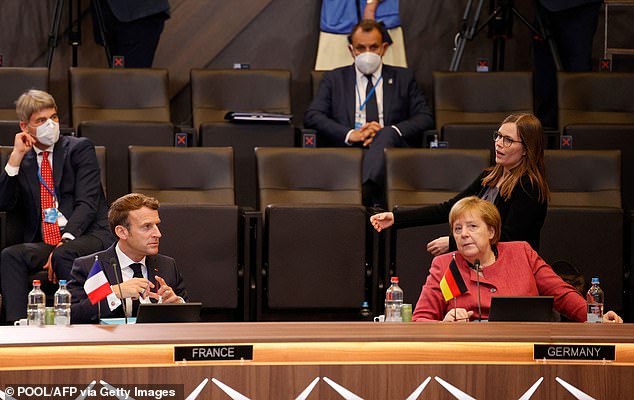
Some allies bristled at the Nato effort to speak out on China. German Chancellor Angela Merkel (pictured right with France’s Emmanuel Macron) said Nato’s decision to name China as a threat ‘shouldn’t be overstated’ because Beijing, like Russia, is also a partner in some areas
The exchanges came a day after the Chinese Embassy to the United Kingdom issued a statement saying the G7 communique ‘deliberately slandered China and arbitrarily interfered in China’s internal affairs’ and exposed the ‘sinister intentions of a few countries, such as the United States’.
China’s embassy in Britain hit back at the G7 for ‘political manipulation’ after the group criticised China’s human rights record.
In a communique after a three-day summit in England, G7 leaders slammed China over abuses against pro-democracy activists in Hong Kong and minorities in the Xinjiang region.
Human rights groups say China has rounded up an estimated one million Uyghurs and other minorities in Xinjiang into internment camps, which Beijing says is to eradicate Islamic extremism.
Biden called for China to ‘start acting more responsibly in terms of international norms on human rights’.
As well as human rights, tensions have soared between Washington and Beijing on a number of fronts in recent years, including trade, technology and the origins of the Covid-19 pandemic.

Joe Biden met with Tayyip Erdogan for talks on the sidelines of NATO’s summit in Brussels on Monday, with the two men greeting each-other with what at first appeared to be a kiss on the hand – though this was only a trick of perspective
In the summit communique, NATO leaders also warned Russia’s President Vladimir Putin, whom Biden will meet on Wednesday in Geneva, that his country’s military build-up and provocative behaviour on NATO’s eastern frontier ‘contribute to instability along NATO borders and beyond’.
When he arrived at the NATO headquarters in Brussels for a summit with his 29 counterparts, Biden stressed that the alliance was ‘critically important’ to US security.
‘I think that there is a growing recognition over the last couple of years that we have new challenges,’ Biden told Stoltenberg at bilateral talks just ahead of the main summit.
‘We have Russia that is not acting in a way that is consistent with what we had hoped, as well as China,’ he said.
‘I want to make it clear: NATO is critically important for US interests in and of itself. If there weren’t one, we’d have to invent it,’ he said.
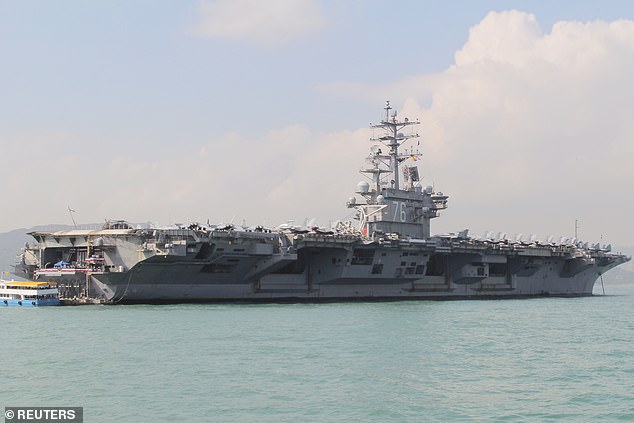
A U.S. aircraft carrier group led by the USS Ronald Reagan (pictured in 2018, file photo) has entered the South China Sea as part of a routine mission, the U.S. Navy said on Tuesday
Meanwhile, a U.S. aircraft carrier group led by the USS Ronald Reagan has entered the South China Sea as part of a routine mission, the U.S. Navy said on Tuesday, at a time of rising tensions between Washington and Beijing, which claims most the disputed waterway.
China frequently objects to U.S. military missions in the South China Sea saying they do not help promote peace or stability, and the announcement follows China blasting the Group of Seven nations for a statement scolding Beijing over a range of issues.
‘While in the South China Sea, the strike group is conducting maritime security operations, which include flight operations with fixed and rotary wing aircraft, maritime strike exercises, and coordinated tactical training between surface and air units,’ the U.S. Navy said.
‘Carrier operations in the South China Sea are part of the U.S. Navy’s routine presence in the Indo-Pacific.’
The carrier is being accompanied by the guided-missile cruiser USS Shiloh and the guided-missile destroyer USS Halsey, it added.
China has ramped up its military presence in the South China Sea in recent years, including building artificial islands and air bases.
The South China Sea has become one of many flashpoints in the testy relationship between China and the United States, with Washington rejecting what it calls unlawful territorial claims by Beijing in the resource-rich waters.
U.S. warships have passed through the South China Sea with increasing frequency in recent years, in a show of force against the Chinese claims.

